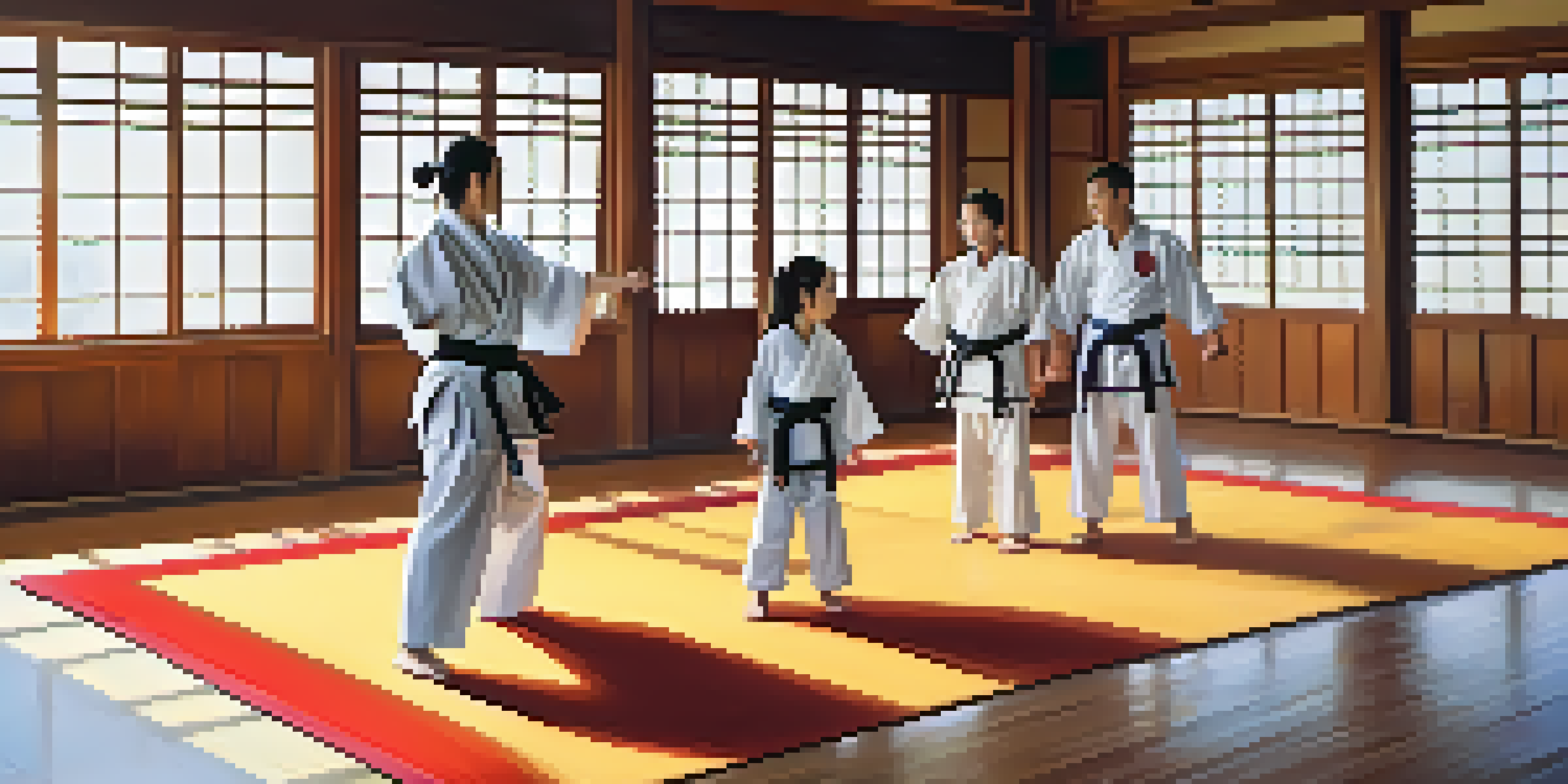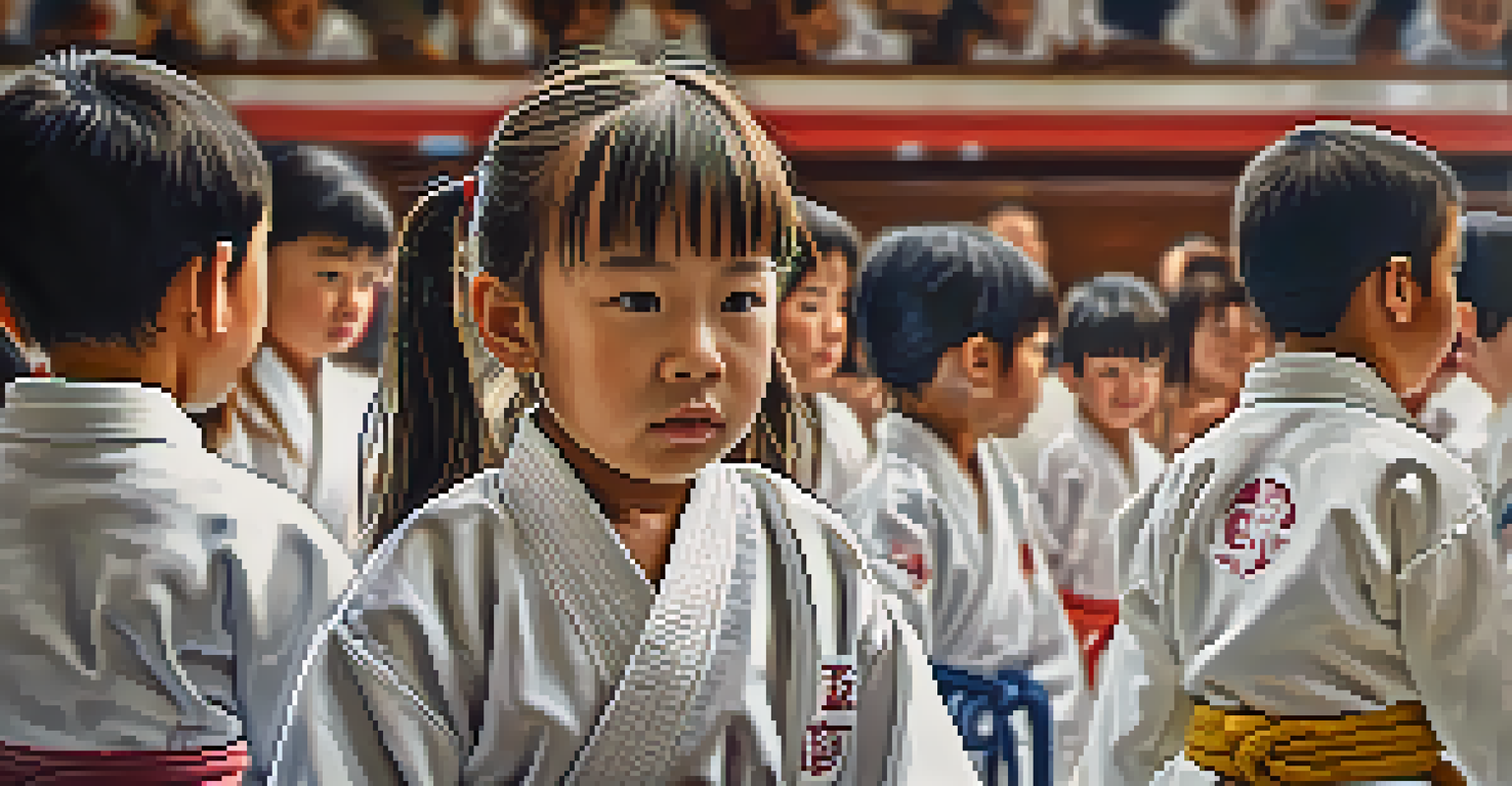The Role of Martial Arts in Promoting Family Mental Health

Understanding Mental Health in Families
Mental health is a vital aspect of family well-being, influencing how family members interact and support one another. When we talk about mental health, we're referring to emotional, psychological, and social well-being. It affects how we think, feel, and act, and is crucial for managing stress and relating to others. Families that prioritize mental health create a nurturing environment where everyone can thrive.
The greatest weapon against stress is our ability to choose one thought over another.
Challenges can arise in families, such as stress from work, school, or personal issues. These stressors can lead to misunderstandings, conflicts, and a breakdown in communication. By recognizing these challenges, families can develop strategies to support each other, promoting a healthier home life. This is where activities like martial arts can play an essential role.
Engaging in shared activities helps families bond and provides a platform for open communication. This is particularly important in today’s fast-paced world, where families often find it challenging to connect. By focusing on mental health, families can create a strong support system that fosters resilience and understanding.
How Martial Arts Foster Family Connections
Martial arts provide a unique opportunity for families to engage in a shared activity, strengthening their bond. When families practice martial arts together, they learn discipline, respect, and teamwork. These values are essential for healthy relationships and can lead to improved communication both in and outside the dojo. The camaraderie built during training sessions creates lasting memories and encourages family unity.

In martial arts, families often face challenges together, like mastering a new technique or preparing for a belt promotion. Overcoming these hurdles as a team can reinforce trust and support among family members. The shared experience of training helps build a sense of belonging and encourages each individual to strive for personal growth while supporting one another.
Martial Arts Strengthen Family Bonds
Engaging in martial arts together fosters discipline, respect, and teamwork, enhancing family connections.
Moreover, martial arts classes often include discussions about respect and perseverance, which can lead to meaningful conversations at home. Parents can use these lessons to teach their children about managing emotions and dealing with stress. This kind of shared learning experience enhances family dynamics and fosters deeper connections.
Physical Activity and Its Mental Health Benefits
Engaging in physical activity, like martial arts, is proven to have significant mental health benefits. Exercise releases endorphins, which are natural mood lifters, helping to reduce anxiety and stress levels. When families participate in martial arts together, they not only improve their physical health but also contribute positively to their mental well-being. This dual benefit makes martial arts an attractive option for family activities.
Strength does not come from physical capacity. It comes from an indomitable will.
Additionally, martial arts training often includes mindfulness practices, such as meditation and breathing techniques, which can enhance emotional regulation. These practices help individuals manage stress more effectively, leading to calmer family interactions. As family members learn to focus and center themselves, they can approach challenges with a clearer mindset.
The combination of physical activity and mindfulness creates a holistic approach to mental health. Families who train together can develop healthier lifestyles that prioritize both physical fitness and emotional resilience. This balance is essential for maintaining strong family bonds and supporting each other's mental health.
Building Confidence Through Martial Arts
One of the most significant benefits of martial arts is the boost in self-confidence it provides. As individuals learn new skills and techniques, they gain a sense of accomplishment, which translates into greater self-esteem. This newfound confidence can be particularly beneficial for children, who may face challenges in school or social settings. When families practice martial arts together, they create a supportive environment that nurtures each member's confidence.
In martial arts, students often face challenges that require them to step outside their comfort zone, whether it's sparring with a partner or performing in front of an audience. Overcoming these challenges fosters resilience and a belief in one's abilities. This is a valuable lesson for families as they navigate life's ups and downs together.
Physical Activity Boosts Mental Health
Practicing martial arts promotes physical fitness and releases endorphins, contributing to better mental well-being.
Confident individuals contribute positively to family dynamics, as they are more likely to express their feelings and advocate for their needs. By supporting each other's journeys in martial arts, family members can celebrate each other's successes, further reinforcing the bonds of trust and mutual respect. This atmosphere of encouragement is essential for promoting mental health within the family.
Conflict Resolution Skills Through Martial Arts
Martial arts training emphasizes respect and discipline, which are crucial for effective conflict resolution. Participants learn to manage their emotions and respond calmly to challenging situations, skills that are directly transferable to family life. By practicing these techniques in a controlled environment, families can develop strategies for navigating conflicts more effectively at home. This leads to healthier communication and stronger relationships.
Families who train in martial arts together often find that they can approach conflicts with a more solution-oriented mindset. Instead of resorting to arguments, they learn to listen and understand each other's perspectives. This shift in approach can significantly reduce the tension during disagreements, paving the way for constructive conversations.
Moreover, martial arts often teach the importance of empathy and perspective-taking. As family members learn to respect their opponents in training, they carry those lessons into their interactions with one another. This newfound understanding fosters a culture of support and compassion, which is vital for maintaining mental health in family dynamics.
Creating a Routine with Martial Arts
Incorporating martial arts into a family routine can provide structure, which is beneficial for mental health. Having a regular schedule for training sessions helps family members stay committed and focused on their goals. This sense of routine can create stability in the home, reducing anxiety and uncertainty. Families that train together can look forward to these shared experiences, making it a highlight of their week.
Additionally, routines can foster accountability and responsibility among family members. When everyone knows their role in the training process, it encourages teamwork and collaboration. This shared commitment strengthens the family bond and reinforces the importance of working together toward common goals.
Conflict Resolution through Training
Martial arts teach families to manage emotions and approach conflicts with empathy, leading to healthier communication.
Creating a routine around martial arts also provides families with a healthy outlet for stress relief. After a long day, attending a class together can serve as a great way to unwind and connect. This intentional time spent training together not only promotes physical fitness but also reinforces the family's commitment to mental well-being.
The Long-Term Impact of Martial Arts on Families
The benefits of practicing martial arts extend far beyond the dojo, impacting families in the long run. As family members cultivate skills like discipline, confidence, and respect, they carry these values into their everyday lives. This positive influence can create a ripple effect, enhancing relationships not just within the family but also in the community. Families that prioritize martial arts often find themselves more resilient in the face of challenges.
Moreover, the lessons learned through martial arts can be passed down through generations. Parents who engage their children in martial arts are instilling values that contribute to their children's overall well-being. As children grow, they can use these skills to navigate life's challenges, promoting mental health for years to come.

Ultimately, the role of martial arts in promoting family mental health is profound. By fostering connection, building confidence, and teaching conflict resolution, martial arts can transform family dynamics. This holistic approach to well-being is an investment in the future, ensuring that families thrive together in a supportive and nurturing environment.